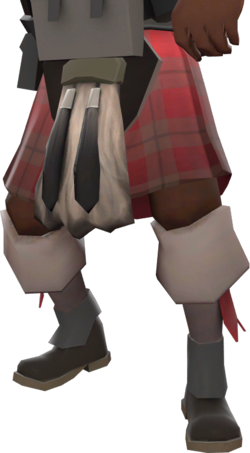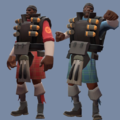Difference between revisions of "Cool Breeze"
(→Trivia) |
Plamen1402 (talk | contribs) m (Fixed a small spelling mistake.) |
||
| Line 45: | Line 45: | ||
* Both the name and description refer to the traditional way of wearing a kilt, in which the wearer has no undergarments beneath it. | * Both the name and description refer to the traditional way of wearing a kilt, in which the wearer has no undergarments beneath it. | ||
* The Concept Demoman wore a kilt similar to the Cool Breeze. | * The Concept Demoman wore a kilt similar to the Cool Breeze. | ||
| − | * The Red kilt shows a close remake of the Clan Stuart while on the other hand the Blu variant is very | + | * The Red kilt shows a close remake of the Clan Stuart while on the other hand the Blu variant is very similar to Clan Mackay. Both of these clans were dominant in Scotland. |
== Gallery == | == Gallery == | ||
Revision as of 06:07, 26 September 2015
| “ | Scotland is not a real country, you are an Englishman with a dress!
Click to listen
— The Soldier, mocking the Demoman's traditions
|
” |
The Cool Breeze is a community-created cosmetic item for the Demoman. It is a traditional Scottish kilt that the Demoman wears instead of his default pants.
The Cool Breeze was contributed to the Steam Workshop under the name "The Refreshing Breeze".
Update history
December 20, 2012 Patch (Mecha Update)
- The Cool Breeze was added to the game.
- [Undocumented] The Cool Breeze was made craftable and was added to the Mann Co. Store.
- Added Cool Breeze to the item drop system.
- [Undocumented] Updated the
equip_regionfor the Cool Breeze.
Unused content
- The Cool Breeze texture is set up for paint to be applied, but the ability to do so is disabled.
Trivia
- Both the name and description refer to the traditional way of wearing a kilt, in which the wearer has no undergarments beneath it.
- The Concept Demoman wore a kilt similar to the Cool Breeze.
- The Red kilt shows a close remake of the Clan Stuart while on the other hand the Blu variant is very similar to Clan Mackay. Both of these clans were dominant in Scotland.
Gallery
| ||||||||||||||||||||||||||||||||||||||
| ||||||||||||||||||||||||||||||||||||||||


